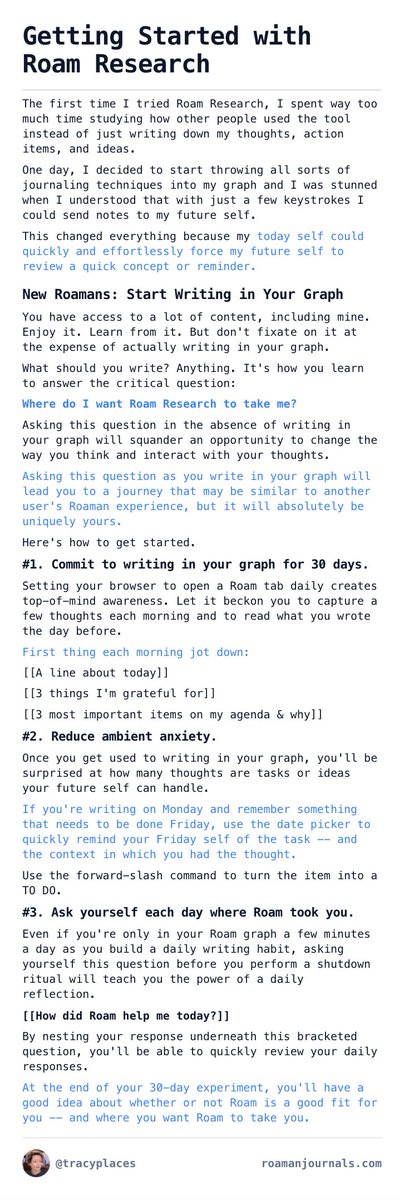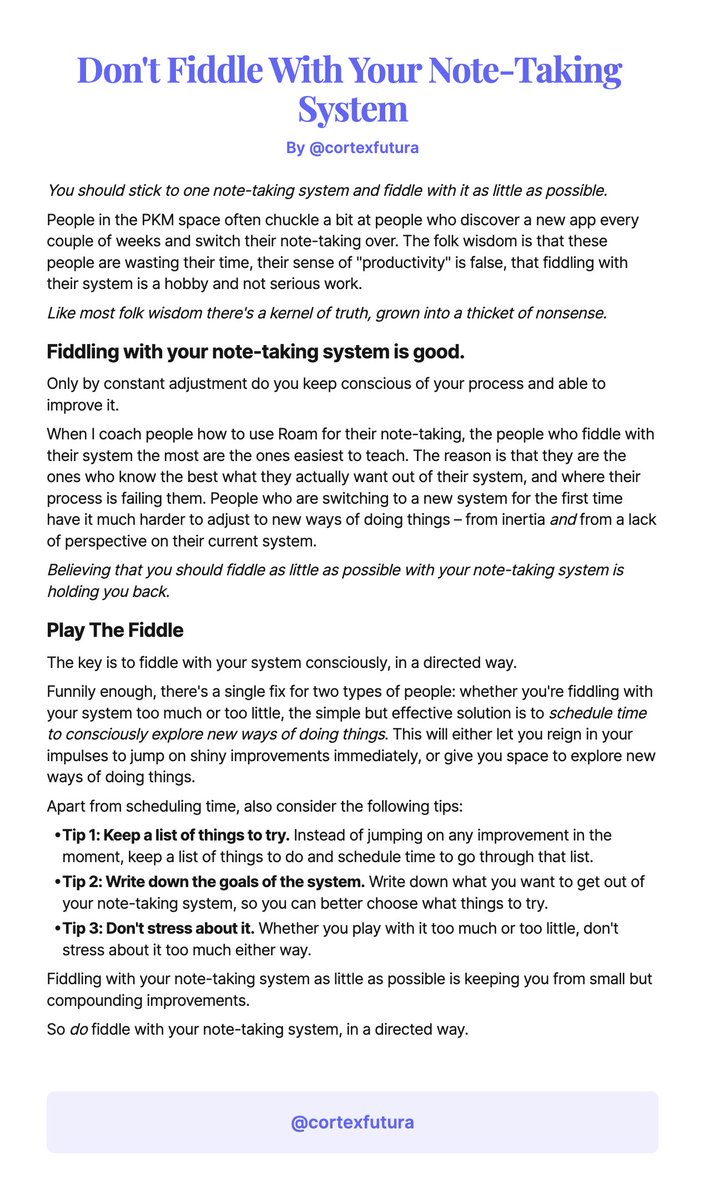[LFR] Letters from a Roaman - Letter XXIII
Hello again fellow Roamans,
As we hit the end of July, my frenzied newsletter writing period has begun. It will be the true test of my habits and the systems that I have developed in Roam, and honed over the past several months. My aim is to not only deliver high-quality writing, but still fit them round my day job of running a small business and still having quality time to spend with my family.
So let’s get on with this edition.
Around the Roaman Empire
I seem to have come across a lot of Roam-related videos in the last few weeks so here’s a quick round-up for your viewing pleasure.
119 minutes of Roam game-film!
📼Akiff Premjee has created a great YouTube video tutorial based on the Roam Fundamentals I tweeted about back in January.
📼 A short Loom from Juan Fernandez, demonstrating how effortlessly he can use Roam to track his work and quickly “fix” up his entries over time.
📼Ryan Muller demonstrates a little roam/js extension he’s created called incanto which allows him to easily program his attention to work his way through his TODO backlog without feeling intimidated or overwhelmed.
📼If you missed the live session, the replay of Ramses Oudt (Roamstack) and Beau Haan’s Keyboard Maestro team-up is now available and well worth your time. Even veteran Roam users like Ramses and I learned a thing or two!
Beau demonstrates how he uses Keyboard Maestro to create a frictionless workflow in Roam. They go deep, and they also secured a discount code for Keyboard Maestro too.
📼In this 12 minute Loom video Conor White-Sullivan demonstrates some of his workflows and how he views Interstitial Journaling as a form of active meditation.
📼An in-progress article and video all rolled into one from Maggie Appleton where she describes how she tends her evergreen notes system including a video walkthrough.
What I really like is how she has taken ideas from both Andy Matuschak and Beau Haan and molded them together into her own interpretation of a zettelkasten which works the way her brain does to help her produce meaningful output.
The video is also great paired with both Beau and Joel Chan’s Roam tour sessions. As Ramses said in his recent newsletter and Maggie in her article we need more “game film for knowledge work”.
Just Do It
As a nice juxtaposition, this is a fantastic atomic essay from Tracy Winchell reminding us that while watching and learning from others is great, at some point we do need to get started and discover things for ourselves.
July 22nd 2021
|
Tree Query
Rob Haisfield has worked with James Lu to create a command-line tool which replicates the Roam query syntax to search through markdown files. It’s helpful for those who want to query their Roam data that’s been exported as Markdown.
Roam In Context
Lukas Kawerau has finally released his free Roam in Context email course. In the style of “choose-your-own-adventure”, you select your particular use-case for Roam and get a customised tutorial complete with example data to upload into your own graph to learn how best to structure your graph.
Lost in Roam
Back in Letter XVIII I mentioned how I’d been enjoying Jesse J Anderson’s Lost in Roam series, however his most recent video really resonated with me. His metaphor of the backwards bike really describes well for me just how Roam changes how you think by “breaking your brain”.
Roam Book Club 5
In case you’ve been hiding under a rock, Roam Book Club 5 started this past Sunday; we’re reading the classic “How to Read a Book”. This round is being led by Mike Kramer and the introduction call lasted almost 6 hours from start to finish, in part because Conor White-Sullivan showed up and the office hours session after the main call turned into an amazing discussion.
It’s not too late to get signed up and join us. It promises to be epic, we will be experimenting together to use Barbara Minto’s Pyramid Principle in Roam to help us more quickly extract and understand information and structure our writing and thinking as we read the book on how to read books. Meta, right.
Thinking Out Loud
I had planned to publish something else this week, but as I was curating the collection of “game film” videos for this week, I was struck by the common thread in all of these videos.
In their own ways they are all removing micro-frictions from their workflows to keep them in their flow state and make their work more effortless.
It reminded me of the recent atomic essay by Lukas Kawerau about fiddling with your note-taking system.
July 7th 2021
|
Removing these micro-frictions is a great example of its application, to become aware of your processes and what gets in the way of achieving your goals.
As Lukas says, incrementally improving your system can only come when you have a clear understanding of what you want out of it.
There are a few things I would add to his list:
1. Use the idea of the 1% Rule to improve a little every day, whether that’s working at your craft and discipline itself or improving your tool to remove a friction.
2. Time-box your “fiddle-time”. As a successful procrastinator, I know it is very easy to find new “optimisations” so if you are not clear on the goals of your session you can burn through your time and not achieve what you set out to discover.
Add the new potential improvements to your running list for a later session.
3. Be clear on what you anticipate gaining and weigh the time it needs to implement against it.
I refer to this XKCD comic regularly as it provides a very useful frame of reference for how much time you can afford to spend fiddling vs how much time you expect to gain from its implementation into your system.
 |
Remember though, it’s not just about the raw time saved from the optimisation. A great example here is Beau’s Keyboard Maestro demo with Ramses. Spending time to make it as frictionless as possible allows him to keep his head in the right focus mode to make the most of his zettelkasten sessions.
They are tiny improvements but they are very real and the compounding effect of those tweaks can be massive when the goal is to make the path between the thought in your head and your long-term thinking system as short and direct as possible.
As always, if you have thoughts on this or other tools-for-thought related topics, hit reply and send me an email. I love reading them all even if it takes me a while to reply!
Until next time,
Andy
Download Roam JSON "Directors Cut"
P.S. Thank you once again to Vincent for your generous support, and a big thanks to Edwin too. Your donations are very much appreciated 💖
If you enjoy my work and would like to help support me with the running costs, you can do so through Buy Me a Coffee. I'm also offering a few personal 1-1 Roam coaching sessions if you're looking for some private help and guidance with your setup.
Andy Henson
I write Letters from a Roaman, curating community news and resources primarily around Roam Research, though I also include other information applicable to other tools for thought and the area in general. I also share my thoughts on a wide variety of tools for thought topics.
Hello Reader, Last week, we talked about Decision Time, the surprisingly effective technique for helping you to get started planning your important tasks and projects. If you did, and you still sat there frozen like a deer in headlights, as promised, here's another little technique that Alan Lakein has up his sleeve that you can try if you're still finding yourself blocked by all the constraints and problems you're facing. This technique is a great psychological way to hack your brain when...
Hello Reader, What do you do when you sit down to plan something out? If you’re anything like me from 5 years or so ago, perhaps it looks something like this: I sit down, pen and paper in hand, and computer at the ready. I get myself a fresh coffee and start thinking about the project or goal I need to work on. I stare into space and ponder the sorts of things that could be done. After about 5 minutes or so of staring, one of two things would happen. 1.I decide I don’t have enough...
Hello Reader, According to Max Lugavere, author of Genius Foods, sitting for an extended period will literally cause blood to drain from your brain, which can impair your cognitive function. As I've touched on over the last few emails, I highlighted the danger of us being active and sedentary. Active movement throughout the day is better for our health and well-being than only exercising once for 30 minutes and then generally sitting still for the rest of the day. Let's wrap up our discussion...







